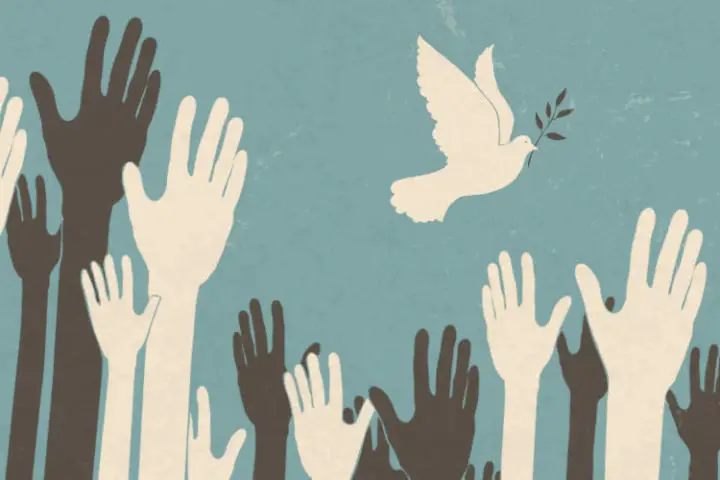“Blessed are the peacemakers, for they will be called sons of God.”
Matthew 5:9
Launchpad #1
Four launchpads for meditation. The first launchpad is a study of the word peace. Whether it is the Hebrew word ‘shalom’ in the Old Testament or the Greek word ‘eirene’ in the New Testament, peace in the Bible does not typically refer to the absence of conflict. Peace should not conjure up a passive picture but instead refers to completeness, wholeness, or restoration. For example, in 1st Kings chapter 9, Solomon establishes shalom for the unfinished temple when he finishes or completes it.
Peace can also be applied to the restoration to wholeness of human relationships. For example, laws in the Torah require bringing peace to a neighbor when you have taken from them. Guilty parties bring peace by restoring their neighbor’s livestock, fields, or money to completeness.
So, in this beatitude, the peacemakers are not passively keeping the peace. They are engaged in active reconciliation. They restore human relationships by turning enemies into friends. Indeed, they are called peacemakers, not peacekeepers.
Launchpad #2
The second launchpad for meditation reflects upon the rarity of peacemakers within the honor-shame cultural context of the time. A common type of conflict of the time is what scholars refer to as the “challenge and riposte”. It starts with someone having a claim of worth or honor. After having the claim challenged, a riposte or defense of the claim must be provided. Lastly, the public gives a verdict of whether the claimant or challenger has won. The winner gains honor while the loser bears the burden of shame.
So, within the honor-shame cultural context, a peacemaker is someone who stops the pattern of challenge and riposte, who ends the spiral of wrongdoing and revenge. A peacemaker is someone who reconciles the broken relationship. By doing so, they disengage from the challenge and instead engage in peacemaking. The result is a loss of honor. Because within the honor-shame cultural context, the community views the peacemaker as someone who is unable to fight for or defend his honor. Their perceived weakness is viewed as shameful by the community. However, the blessing in this beatitude is that the shamed peacemakers are given the honorable title of “sons of God”. But what is the meaning of this honorable title?
Launchpad #3
The third launchpad for meditation explores the connection between peacemaking and being called a son of God. Simply put, the greatest peacemaker and the son of God is Jesus. Referring to Jesus, Colossians 1:20 reads “and through him to reconcile to himself all things, whether on earth or in heaven, making peace by the blood of his cross.”
As humans, we have rebelled against God, creating conflict with our creator. But Jesus brought peace by the blood of his cross, making a way for our relationships with God to be completely restored. Since Jesus is the ultimate peacemaker and the son of God, when we embrace peacemaking, we look more like Jesus, and therefore more like sons of God.
But, once again, peacemaking can come at a cost. For Jesus the cost was terrible, but He endured the shame of the cross. And the Father glorified Jesus by restoring him to a place of honor.
So, if we lose honor by being peacemakers, remember the blessing of this beatitude. The shame is temporary, but the honorable status of being called a son of God is eternal.
Launchpad #4
The fourth launchpad for meditation considers two examples of peacemaking in action. The first example comes from the parable of the lost son in Luke 15. When the father throws a party to celebrate the return of the rebellious younger son, the older son gets angry and refuses to join the feast. In the cultural context, this is an attack on the father’s honor. But rather than defend his honor by shaming the older son, the father engages in peacemaking. Although the community would view the father as weak and shameful, the father disregards the shame by going outside to seek reconciliation with the older son. Rather than returning insult with insult, the father speaks tenderly to his older son. In this parable, the father is a peacemaker breaking the pattern of challenge and riposte.
The 2nd example comes from present day Somalia and is described in the book entitled “Killing Christians – Living the Faith Where It’s Not Safe to Believe”. The book describes the interactions between a new Christian, named Azzam, and two people who murdered his mother. The book describes the expected showdown between Azzam and the two murderers. Describing the murderer’s expectations: “there would be no other reason for him to confront us other than to avenge his mother’s death and kill us both to honor her.”
But instead of harming his mother’s murderers, Azzam forgives them. He says to the murderers, “You need to know that I love you and have prayed for both of you ever since I saw your picture with my mother. Jesus filled my heart with compassion for you. You need Him – just like I did. He can forgive murderers. His love is greater than anything you’ve done.”
Compelled by Azzam’s radical peacemaking, the two murderers became followers of Jesus. So, when we are at peace with God, we can make peace with our enemies. And in the case of Azzam, our peacemaking may even lead to welcoming former enemies into the family as fellow sons of God.



